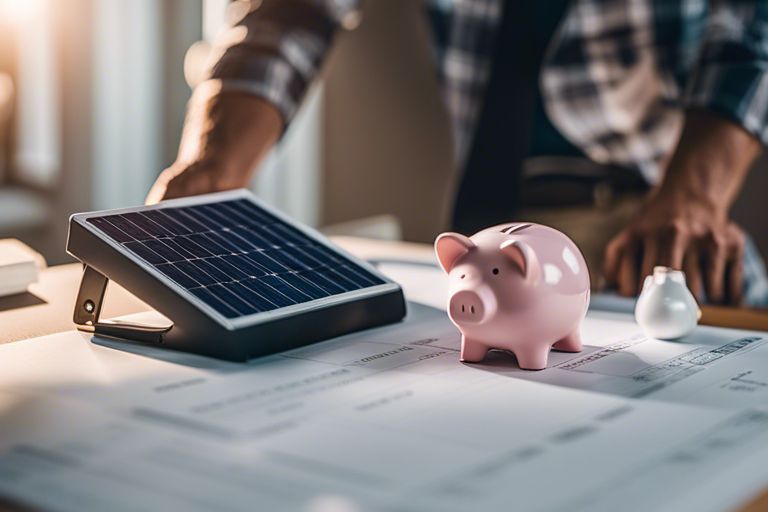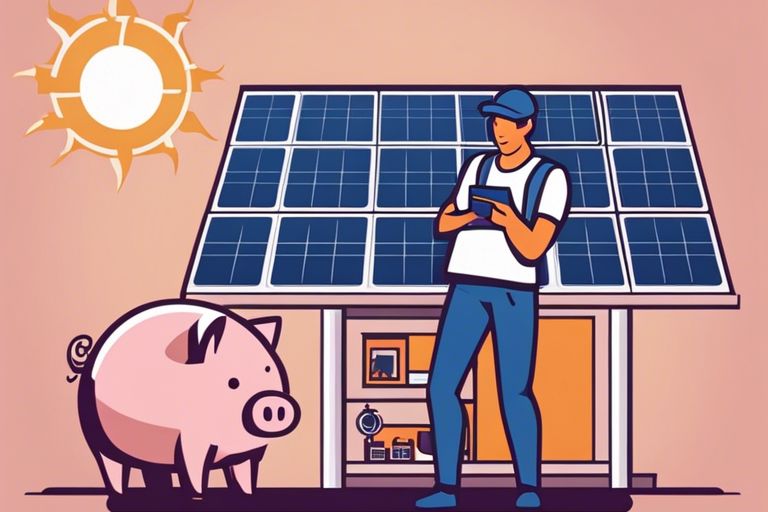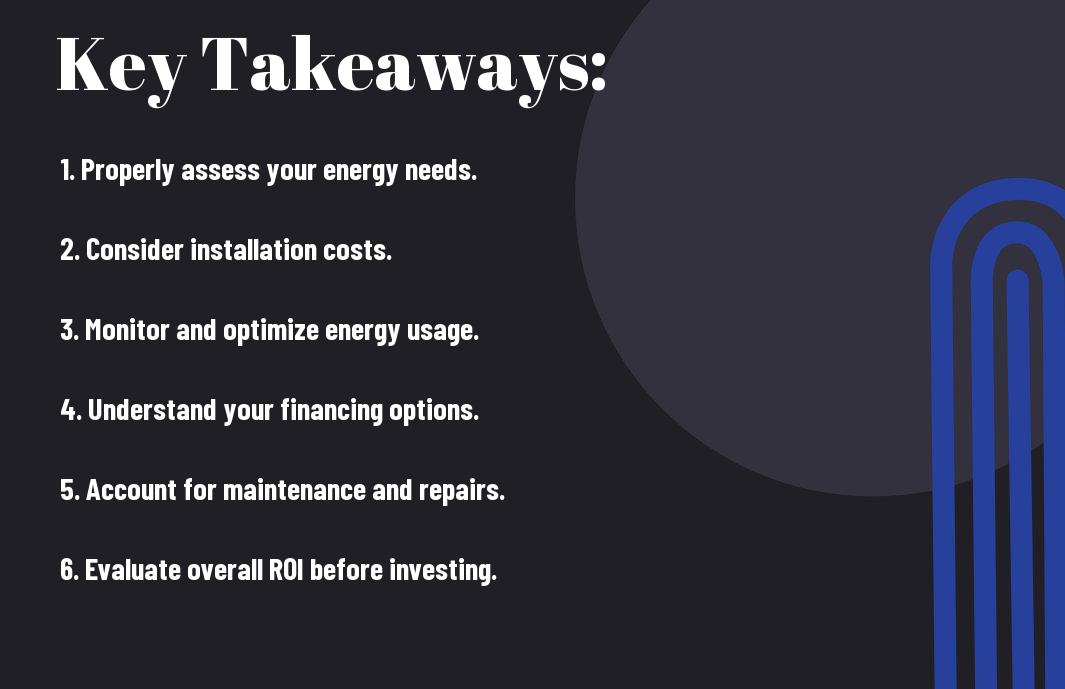With the increasing popularity of solar panels as a sustainable energy solution, you may have made the investment expecting substantial savings on your energy bills. However, several factors can impact the extent of your savings with this technology. Understanding these reasons can help you manage your expectations and make informed decisions regarding your solar panel investment.
Key Takeaways:
- Misalignment of expectations: It is important to set realistic expectations regarding the savings potential with solar panels.
- Underestimating upfront costs: The initial cost of installation and equipment may be higher than expected, impacting the immediate savings.
- Lack of energy efficiency: Without addressing energy efficiency in the home, the full potential savings from solar panels may not be realized.
Common Misconceptions
While you may have high hopes for how much money you’ll save with solar panels, there are some common misconceptions that could be contributing to your disappointment.
Unrealistic Expectations
An unrealistic expectation that many people have when investing in solar panels is that they will immediately see a significant reduction in their electricity bills. While solar panels can save you money in the long run, it’s important to understand that the savings may not be as substantial as you initially thought. Factors such as the size of your system, local electricity rates, and weather conditions can all impact the amount of money you save each month.
Lack of Research
Misconceptions about the financial benefits of solar panels can also stem from a lack of thorough research. Many people don’t take the time to fully understand how solar panels work, how much they can realistically save on their energy bills, and what incentives or rebates are available in their area. This lack of research can lead to unrealistic expectations and ultimately disappointment when the savings aren’t as significant as expected.
For instance, understanding the different financing options for solar panels, like leasing or purchasing, can make a big difference in how much money you save in the long run. By doing your research and having a clear understanding of the costs and benefits associated with solar panels, you can set more realistic expectations and make a more informed decision about whether solar panels are the right choice for you.
Installation Issues
There’s nothing more frustrating than not seeing the savings you expected after installing solar panels. If you’re wondering why your utility bill hasn’t decreased as much as you’d hoped, it could be due to various installation issues. For more detailed information on this topic, you can check out our blog post I Just Installed Solar Panels. Why Isn’t My Utility Bill Lower?.
Inadequate System Sizing
Inadequate system sizing means that your solar panels may not be generating enough electricity to offset your energy consumption. If the system was not sized correctly based on your energy needs and consumption patterns, you may not be producing as much energy as required. This can result in a lower-than-expected reduction in your utility bills.
Poor Panel Placement
Poor placement of solar panels can significantly impact their efficiency. If your panels are not placed in an area where they can receive maximum sunlight exposure throughout the day, their energy production will be compromised. Shaded areas, incorrect tilt angles, or obstructions like nearby buildings or trees can all contribute to poor panel performance.
System design and panel placement are crucial factors in ensuring optimal energy production. An experienced solar installer will take into account your roof orientation, shading issues, and other factors to determine the best placement for your panels.
Subpar Installation Quality
Quality matters when it comes to solar panel installation. If corners were cut during the installation process or inferior materials were used, your system’s performance could be compromised. Subpar installation quality can lead to issues such as loose connections, inefficiencies in energy production, or even system failures.
Plus, inadequate sealing or weatherproofing can result in water damage or other issues that could affect the longevity and performance of your solar panels. It’s necessary to ensure that your solar installation is done right the first time to maximize savings and benefits in the long run.
Energy Consumption Patterns
Now, if you find yourself wondering why you’re not saving money with your solar panels, it might be worth examining your energy consumption patterns. A discussion on Reddit titled Solar panels doesn’t seem to reduce costs. What am I … sheds some light on this topic.
Increased Energy Usage
Energy consumption tends to increase over time due to lifestyle changes or the addition of new electronics and appliances. While solar panels can offset some of these additional energy needs, if your consumption continues to rise, you may not see a significant reduction in your bills.
Inefficient Appliances
The efficiency of your household appliances can also impact the effectiveness of your solar panels. Older or inefficient appliances can consume more energy than newer, energy-efficient models, putting a strain on your solar power system.
With advancements in technology, modern appliances are designed to be more energy-efficient, which can help you maximize the benefits of your solar panels and ultimately save more money on your energy bills.
Unoptimized Energy Habits
Energy-saving habits play a critical role in determining the overall effectiveness of your solar panels. If you leave lights on unnecessarily, keep devices plugged in when not in use, or consistently run high-energy-consuming appliances during peak hours, you might not be leveraging your solar system to its full potential.
Developing energy-conscious habits such as using appliances during off-peak hours, optimizing natural light, and unplugging devices when not in use can help you make the most out of your solar panels and see greater savings in the long run.
Inverter and Equipment Problems
Your solar panels not reducing your bill could be due to issues with your inverter and other equipment.
Inverter Failure
One common reason why your solar panels may not be saving you money is inverter failure. The inverter is a crucial component of your solar panel system as it converts the DC electricity produced by your panels into usable AC electricity for your home. If your inverter is not functioning correctly, it can impact the overall efficiency of your system and lead to a decrease in energy production. It’s vital to have your inverter regularly checked and maintained to ensure optimal performance.
Panel Degradation
Inverter failures aside, another factor to consider is panel degradation. Over time, solar panels can degrade due to various environmental factors such as exposure to sunlight, weather conditions, and dirt buildup. This degradation can result in reduced energy production and, ultimately, a decrease in savings on your electricity bills. Regular maintenance and cleaning can help mitigate panel degradation and ensure that your system operates efficiently for years to come.
This gradual degradation can be a natural part of owning solar panels, so it’s crucial to monitor your system’s performance regularly and address any issues promptly.
Inadequate Maintenance
For your solar panels to function optimally and save you money, proper maintenance is key. Neglecting regular upkeep, such as cleaning the panels, checking for any shading issues, or ensuring all components are working correctly, can lead to decreased efficiency and savings. By investing time and effort into maintaining your solar panel system, you can maximize its lifespan and performance, ultimately leading to more significant savings on your energy bills.
Equipment
It’s vital to remember that solar panel systems comprise various components beyond just the panels themselves. Inverters, wiring, and mounting hardware all play a crucial role in the system’s overall efficiency. If any of these components are faulty or not properly installed, it can impact the performance of your system and hinder your ability to save money on your electricity bills. Regular inspections and maintenance of all system components are vital to ensure everything is working as it should and maximizing your savings potential.
Local and Environmental Factors
All solar panel systems are affected by various local and environmental factors that can impact their efficiency and, consequently, your potential savings. It is important to consider these factors when evaluating the effectiveness of your solar panels.
-
-
Shading and Obstructions
-
Obstructions such as trees, buildings, or other structures can cast shadows on your solar panels, reducing the amount of sunlight they receive. This can significantly decrease the energy production of your system, leading to lower savings on your electricity bill. It is crucial to ensure that your solar panels are installed in an area with minimal shading to maximize their efficiency.
The positioning of your solar panels in relation to potential obstructions must be carefully planned to prevent any shading during peak sunlight hours. Ensuring that your panels have access to direct sunlight for the majority of the day will optimize their performance and increase your cost savings over time.
-
-
Weather Patterns
-
Shading and other environmental factors influence the amount of sunlight your solar panels receive. Weather patterns, such as frequent cloud cover or long periods of rain, can impact the efficiency of your solar panels. While some cloud cover is normal and will not drastically reduce energy production, continuous overcast conditions can affect the output of your system.
Local Building Codes and Regulations
Codes
Local building codes and regulations may also impact your ability to save money with solar panels. Some areas have specific requirements for the installation of solar panel systems, dictating factors such as placement, size, and safety measures. Failure to comply with these regulations may result in fines or restrictions on your system, affecting your overall savings.
Regulations
It is crucial to research and adhere to local building codes and regulations when installing solar panels on your property. By ensuring that your system meets all necessary requirements, you can maximize its efficiency and long-term savings potential. Consulting with a professional installer can help you navigate these regulations and optimize your solar panel investment.
Monitoring and Maintenance
Infrequent Performance Checks
An infrequent check on your solar panels’ performance can result in missed opportunities to address any issues that may be affecting their efficiency. Make it a habit to monitor your system regularly to ensure it is functioning at its optimal level.
Neglecting Regular Cleaning
With solar panels, neglecting regular cleaning can significantly impact their performance. Dust, dirt, bird droppings, and other debris can accumulate on the panels, blocking sunlight and reducing their efficiency. It is crucial to schedule regular cleaning to maintain the effectiveness of your solar system.
A simple cleaning routine can go a long way in ensuring your solar panels operate efficiently. You can use a soft brush, mild detergent, and water to clean the surface of the panels. By keeping them clean, you can maximize their energy production and ultimately save more money in the long run.
Ignoring Error Messages
Performance checks on your solar panels are crucial to detect any error messages promptly. Ignoring these messages can lead to system failures or reduced efficiency, ultimately impacting your savings. It is crucial to address any error messages promptly to ensure your solar panels are functioning correctly.
Checks on error messages can help you identify potential issues with your solar panels early on, allowing you to take the necessary steps to resolve them efficiently. By addressing these messages promptly, you can prevent any major problems that may impact the performance of your solar system.
To wrap up
With these considerations in mind, it is vital to understand that saving money with solar panels depends on various factors such as your location, energy consumption habits, the size and efficiency of the system, and the financing options available to you. By taking a closer look at these factors and making informed decisions, you can maximize the benefits of solar energy and potentially save money in the long run.
Be mindful of, investing in solar panels is not only about immediate cost savings but also about long-term sustainability and energy independence. So, while you may not see significant savings right away, the overall impact on the environment and your wallet over time can be well worth the initial investment. Keep exploring your options, stay informed, and make decisions that align with your goals and values for a brighter and more sustainable future.
Q: Why am I not saving money with solar panels?
A: There can be several reasons why you may not be saving money with solar panels:
- Your energy consumption: If your energy consumption is higher than your solar panels can produce, you may still need to rely on the grid for electricity, leading to higher costs.
- Cost of installation: The upfront cost of installing solar panels can be high, and it may take several years to recoup the initial investment through savings on energy bills.
- Inefficiency: If your solar panels are not properly maintained or are not functioning at optimal efficiency, it can impact the amount of savings you can achieve.
Q: How can I increase my savings with solar panels?
A: To increase your savings with solar panels, consider the following:
- Optimizing energy consumption: Try to reduce energy usage during peak hours and make the most of the solar energy generated during the day.
- Energy storage: Investing in a battery storage system can help store excess energy generated during the day for use at night, reducing reliance on the grid.
- Maintain your solar panels: Regular maintenance and cleaning of solar panels can ensure optimal efficiency and energy production, leading to higher savings.
Q: Are there any incentives or rebates available to help save money with solar panels?
A: Yes, there are various incentives and rebates available to help you save money with solar panels:
- Solar Investment Tax Credit (ITC): Eligible homeowners can receive a tax credit for a percentage of the cost of installing a solar energy system.
- Net metering: Some utility companies offer net metering programs where you can earn credits for excess energy produced by your solar panels that is fed back into the grid.
- Local rebates: Many states and local governments offer rebates or financial incentives for installing solar panels, which can help offset the initial installation costs.



